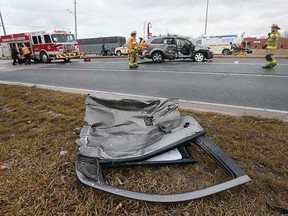
Article content
A judge has set aside the recent guilty verdicts of a Lakeshore man convicted in the deaths of two people in a 2020 collision after a Windsor police traffic reconstruction report was deemed erroneous.
Following a trial in the fall, Philip Hayes, 33, was convicted on two criminal counts of dangerous driving causing death. A Jan. 4, 2020, two-vehicle collision occurred at Lauzon Parkway and Forest Glade Drive resulted in the deaths of Brett Blandford, 61, and passenger, Diane Salter, 63.
Advertisement 2
Article content
Article content
But in a rare move on the day scheduled for his sentencing hearing in a downtown Windsor courtroom, Hayes’s convictions were set aside Thursday.
“Hopefully you never have to come back to court again. And have a good life,” said Superior Court Justice Russell Raikes, who presided over the original trial that resulted in guilty verdicts.
“At the end of the day we got it right,” Raikes said. “The system worked because of the diligence of counsel.”
Hayes was facing a potentially lengthy jail term.
“Mr. Hayes was a step away from a six- to eight-year sentence,” said defence lawyer Michael Lacy. “That is something that has been very difficult for my client and his family.”
Hayes was driving a Ford F-350 pickup truck when it collided with a Dodge Journey. A traffic reconstruction report presented at the original trial prompted the judge to discount a defence argument which contradicted Crown evidence suggesting the truck was travelling aggressively.

Raikes said in his judgment last October that the Ford F-350 driven by Hayes “whipped past … vehicles” that were also southbound on Lauzon Parkway before running a red light and slamming into the front passenger side of a 2013 Dodge Journey SUV.
Article content
Advertisement 3
Article content
Raikes said in his original judgment that he didn’t believe the testimony from Hayes, who testified he had been driving just above the 70 km/h posted speed limit. He said he approached the intersection “with caution” and that “all of a sudden the car is in front.”
The trial judge also discounted evidence of a witness who was also southbound on Lauzon who testified that while he didn’t see the crash ahead of him he did see Hayes’s vehicle enter the intersection on a green light.
But all that changed Thursday, when Lacy introduced a new accident reconstruction report for the defence by forensic engineer Barry Rafferty that contradicted the original Windsor police report.
Assistant Crown attorney Bryan Pillon acknowledged that the officer who wrote the original reconstruction report reviewed Rafferty’s report and agreed with the new conclusions.
The original investigating officer, now with more experience and training, “accepted Rafferty’s conclusions in its entirety,” Pillon said.
“With the benefit of more experience and training, the officer has done a mea culpa,” Lacy said. He asked the judge to set aside the convictions and render a not guilty verdict.
Advertisement 4
Article content
“This has been an exceptionally difficult case for all parties … as it caused further pain for the family of the deceased,” said Pillon.
The new evidence suggested Hayes was not speeding and did not run a red light, Pillon said.
“The Crown is left with very little evidence … that Mr. Hayes committed a criminal offence.”
Pillon said he spent days reviewing the two traffic reconstruction reports.
He said the officer who wrote the first report had the “core humility” to admit his conclusions were wrong.
The judge also acknowledged the officer for admitting his error. “When given the opportunity to correct his mistake, he did,” Raikes said.
“It’s very sad that there are two people whose full potential will not be realized.”
The original trial defence lawyer did not hire a traffic reconstruction expert to challenge the police report.
In an interview after the court proceedings, Lacy told the Windsor Star that the Crown agreed that “we could not allow the findings of guilt to stand.
“It would be a miscarriage of justice for Mr. Hayes to be found guilty of these very serious offences.
Advertisement 5
Article content
“He’s vindicated. He didn’t do anything wrong. He didn’t commit a crime. He was found guilty in circumstances where he never should have been found guilty.”
Asked how a similar situation could be avoided in the future, Lacy noted that Ontario Provincial Police typically conduct a peer review of traffic reports to see whether the evidence is scientifically sound before laying charges.
A peer review by Windsor police may have avoided an incorrect verdict, he said.
The Windsor Police Service did not respond before Friday’s print deadline to a Star query about whether the force has changed its traffic reconstruction reporting procedure.

The officer’s admission of an error in his report “doesn’t change the fact that that mistake has cost my client significantly, both emotionally, psychologically and financially,” said Lacy.
Hayes’s extended family tried to help financially and he had an extremely supportive spouse, said Lacy.
The experience has been “devastating” for Hayes, he said.
“Just imagine you’re involved in a horrible traffic accident and … you’re not the cause of the accident, but you get arrested right away. You get blamed for causing the death of two people. You have to put together financial resources to defend yourself.
Advertisement 6
Article content
Recommended from Editorial
“He had to hire his initial trial lawyer, ends up getting convicted. Found that he was not believable on the witness stand, his version of events, even though we now know it’s supported by the expert evidence.
“Then he had to hire a lawyer for the appeal. The Crown was asking for up to eight years in jail.
“You can just imagine the impact and effect of being falsely charged with something, being convicted of something you didn’t do. Just imagine if it was someone who didn’t have those resources.
“You don’t save for a rainy day to hire a criminal lawyer.”
— With files by Doug Schmidt
Article content





